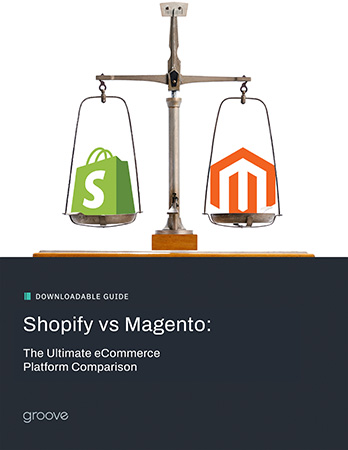Magento is a widely used locally hosted, open-source eCommerce platform. This robust platform caters to medium and large enterprises and businesses. In 2019, Magento websites accounted for about 30% of the market share in eCommerce. But what about Magento SEO Optimization? Is Magento set up to easily optimize your website for SEO so your website will rank high in search results? The answer is a resounding yes.
Basic Magento SEO Optimization Features
For eCommerce success, SEO is one of the most important things to consider when building your site. One of the best things about Magento is that it comes with SEO adjustment tools such as a sitemap.xml, robots.txt, and more than one option for redirecting pages. Let's dive in and learn more about how you can leverage Magento eCommerce SEO tools to grow your site traffic.
Robots.txt File
Magento allows you to configure your site's robots.txt file. With this option, you can limit the number of pages Google can crawl on your site. It's important to configure your robots.txt file if your Magento site uses faceted navigation. We'll go into more detail about this type of navigation below.
Sitemap.xml
To ensure Google has a clear pathway to discover your site's important URLs, you can create a sitemap.xml file using Magento's default built-in capability. Magento configures the settings automatically, but you may need to generate the sitemap.xml file on your site so that it's published on the site. Do this by going to Marketing, and choose SEO & Search, then "Site Map." Follow the prompts on the page to publish your sitemap.
URL Rewriting
By default, Magento will add .html as the URL extension for category and product URLs. The results are lengthier URLs that make it harder for users to read. Removing this extension will improve user experience, which will help you rank higher in search engines.
Advanced SEO Magento Optimization Techniques
Many well-known companies build their enterprise websites with Magento, including American Express, Xerox, Puma, Ford, and more. How do these websites manage to rank high in search engine results? They employ advanced Magento SEO optimization techniques like those we cover below.
Layered Navigation
Layered navigation is designed to enhance the user experience. It allows customers to filter products based on a variety of attributes. eCommerce stores with a large inventory can especially benefit from a layered navigation functionality. Customers can narrow down their choices based on things such as color, size, price, or brand.
JavaScript Rendering
Content on Magento sites is loaded through JavaScript. Magento uses JavaScript frequently for loading key content to the eCommerce store. Because JavaScript is used to lead much of a page's content, you need to make sure your JavaScript is being properly indexed. To do this, you can use tools like the Rich Results Test or the Mobile Friendly Testing Tool.
On-Page Content: Title Tags, Meta Tags, and Meta Descriptions
A Magento website doesn't set canonical tags by default for both category and product pages. Ideally, these tags will be in place so search engines can effectively crawl and index a site. However, you can easily adjust these settings in your store's configuration by choosing "Search Engine Optimization" and checking "yes" to the options to use canonical link meta tags for products and categories.
Global Redirects
One of the things Magento does is implement global redirects on your website. For example, if your store uses "https" or "www," Magento will automatically redirect site visitors to the correct URL even if they don't type those prefixes. However, Magento uses 302 redirects instead of the preferred 301 redirects. To change your redirects to 301, go to your store's configuration and choose "Web" from the "General: dropdown. From there, you can make this change.
Integrating Magento with Other SEO Tools
Effective SEO requires a lot of work, and ever-changing algorithms make Magento SEO optimization even more challenging. Implementing some of these tools can help you handle complicated tasks.
- Website Auditor: A website auditor tool is designed to improve your SEO by scanning your eCommerce site to identify issues that hurt your search engine ranking.
- Google Analytics: With Google Analytics, you can identify which of your site's pages are being visited. Google Analytics also has more advanced functions, such as tracking click-through rates, conversions, and referral traffic.
- Keyword Planning Tools: Before you design your site, do some keyword research. This will help you make sure you're setting yourself up for SEO success from day one. Some options include Google Keyword Planner and SEMrush.
- Google Search Console: This free Google service helps website owners monitor their site's Google search results visibility.
Common Magento SEO Mistakes You Should Avoid
There are going to be mistakes when building any website. However, knowing the most common mistakes made with Magento eCommerce SEO will help you get off to a great start.
Keyword Stuffing and/or Irrelevant Keywords
In the old days, web designers were able to game search engines by stuffing keywords into site pages or the site's code. Today, that will quickly get your website to rank lower. Try to avoid using repetitive keywords.
Faceted Navigation Issues
This type of navigation creates massive indexing and crawling issues because it increases the number of pages a search engine has to crawl. Using layered navigation and taking steps to control the crawl can help you optimize your Magento SEO.
Product Images Not Optimized
Many shoppers will find your page by searching images on search engines. For this reason, you have to make sure your images are properly optimized and include an alt tag. When you name your image, avoid using generic names. Instead, be specific. For example, if you sell jewelry, an image of a gold watch would be named gold-watch.jpg. Equally important, add alt text to your images. This is designed to make a website and images more accessible, and it also helps with SEO.
Future Trends in Magento SEO: Magento eCommerce SEO and More
Mobile eCommerce continues to grow, so a solid Magento eCommerce SEO plan has to include plenty of room for responsive design and easy navigation on smartphones and other mobile devices.
AI and machine learning will continue to advance, and these tools will help personalize your customers' shopping experience. Additionally, AI tools will advance to more accurately predict customer behavior. Learning to use these tools for tasks such as keyword research will save eCommerce store owners time and money.
The best way to stay on top of Magento SEO is to keep learning. The digital market landscape evolves constantly, so it's crucial to stay up-to-date on changing algorithms and trends. Then, use your knowledge to adapt your SEO strategies. Following the tips in this article will put you on your way to a high ranking on SERPs

eBook
Shopify vs Magento: The Ultimate eCommerce Platform Comparison
Explore tags:
About the author
Subscribe to the Groove Newsletter
Get the latest updates and insights straight to your inbox






